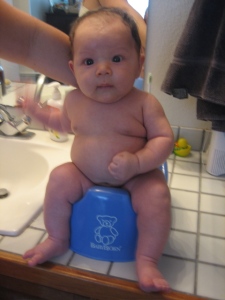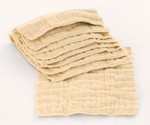I am interested in understanding elimination communication. I may or may not be able to implement it because I will be working full time but at least I want to understand it and give it a try.
– Expecting in Idaho
Make that time and a half, dear Ayi-to-be in Idaho! Every mother is a working mother. If I hear you right, you are referring to work outside the home while your little one is in – or not in – diapers. If your partner is also planning to work outside the home during this time then both of you will be handling the demands of the home and office. Fortunately, infant hygiene is one of many departments where Ayi and Baba alike can take care of the baby’s needs, and diaper-free hygiene takes care of the need to be heard as well as the need to stay clean. While you are at the office, whoever is taking care of the baby can communicate.
Diaper-free hygiene takes more work in the short-term but is less work on the whole. In addition to good hygiene, it has benefits that make the work worthwhile. (Why?)
How to get started:
1. Cover the furniture, not the baby’s bottom. If you are worried about having a diaper-free baby on the floor, simply cover the floor with a waterproof sheet. You can get such sheets in various sizes for beds, laps, chairs, sofas, carseats, etc. On top of the waterproof sheet, you can put old towels, sheets, clothes or even diapers. A basic cloth diaper that requires immediate attention when wet or dirty will not interfere with EC but the longer and more often a diaper is left unattended, the less likely it is that you and baby will tune in and develop the communication required for a good standard of hygiene, starting with prompt changing and leading to timely potty use.
2. Whenever baby wets, offer the potty before putting on a new diaper / underpants. Sometimes there is more to come. You may find that #2 follows #1. Since it is more comfortable to go into a potty than into a diaper, babies are more likely to eliminate completely when they are free to go without soiling themselves.
3. Offer the potty at regular times, such as after feeding, waking, and any other times you start noticing that baby tends to go.
4. Observe what baby does before and while eliminating. It could be a particular expression, squirm, yawn, or gesture. You can also make cueing sounds when you take baby to potty. Read more at EC Cues and Signals.
5. Carry your potty in your diaper bag. In a public bathroom, you can place the potty on the floor, on the changing table, or on the counter next to the sink. Right after reaching our destination was a very typical time for me to offer the potty.

Baby on potty. Source: Sensible Girlfriend’s Guide to Life
When to start going diaper-free
Regardless of whether you intend to practice ec, remember that babies are entitled to some diaper-free time daily, right from birth. And if you do practice ec, you can start slowly. It’s not about the number of diapers you use, but how you communicate.
I have heard that it is easier to start communicating if you go diaper-free from the very beginning, and that babies who are allowed to pass their first stool (meconium) unhindered by a diaper are easier to ec. Another option is to start around 2 – 4 months, before baby starts rolling over. This is also supposed to be a good window for developing communication.
From 6 months onwards, babies become more mobile and it may take more effort to establish communication but I can say from experience that it is still possible, especially if you have been using cloth / changing promptly and baby has not gotten used to sitting in a wet / dirty diaper. In the case of disposables that claim to absorb so efficiently that baby stays dry, long intervals between going and getting changed can lead baby to stop expecting prompt action following elimination, and to consider the diaper the appropriate place to go.
If you wait longer than a year to start, baby may be so used to being in diapers and more interested in exploring skills like walking and talking that you have to change your approach. Some people find a warm time of year and simply let baby go bare bottomed. By two years, babies are not only used to diapers but less than receptive to the being told that what they have done all their life must now change.
When do we stop communicating?
I often used to wonder, when will I stop knowing when baby needs to go? Long past the time that my daughter needed help to seat herself on the potty, she still saw fit to inform one of us each and every time she went. Some children become diaper-free in the daytime but still use them at night. From what I have read, bedwetting at night does not merit worry, and it is not advisable to try to communicate with someone who is asleep!
Remember: The c in ec stands for communication, not catching, so resist the temptation to evaluate your progress based on number of catches, misses and the like.
Basic Supplies Needed:
Bathroom sink, bowl or Little Potty. Get a potty for each bathroom. You can also keep one by your bedside (or move it there at night).
2-3 dozen prefolds. You can also use Pieces of Cloth – cut up old towels or T shirts are fine (cut them approximately 11 x 14 inches if you plan to wrap them around baby’s bottom, larger if you are just placing them on the bed / mat / floor / etc). Prefolds are the basic cloth diapers sold in the store and online. You close them with a “Snappi.” In the old days we used Diaper Pins with ducks and such on the closure, but these are now only used for saris. In India you can get flat, contoured cloth diapers with little drawstrings or velcro for easy closure.
Waterproof sheets for bed, lap and other places baby frequents. Water-resistant sheets come in cotton, flannel, wool and blended fabrics, while waterproof sheets are made in rubber and vynil.
Deluxe Supplies
If you actually go online to search for cloth diapers you will find gazillions of them and they are so pretty. Many of these are too thick / absorbent / waterproof to use full time if you are trying to ec but you can still use them sometimes e.g. when going out or for overnight.
Online Support can help if you live in a place where diaper-free hygiene is no longer or not yet mainstream. In my day, my go-to was Mothering.com. Diaper-free Baby lists local support groups and numerous resources. Another impressive site is The Other Side of the Moon.





[…] something that won’t be useful somewhere down the line. Plus, there are some people that do elimination communication (or EC) as early as the newborn days, so I suppose it makes sense to give partial potty training a […]
LikeLike